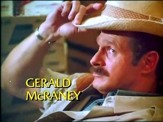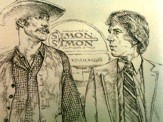A Hollywood Ending
By: Hara Estroff Marano
Summary: Delta Burke & her husband talk about her winning battle against depression.
Work, success, fame? Everything she always wanted?couldn't save Delta Burke from disabling bouts of the blues. In fact they only intensified them. Beloved for her Emmy-award-winning role as Suzanne Sugarbaker on the long-running sitcom Designing Women, Delta eventually fought back. How she did it is a story of wit, grit, medication and insight in equal measure. Perhaps even more, it is an unusual story of love. Since 1989, Delta has been married to actor Gerald McRaney, well known as Major Dad. Their conversation goes right to the heart of the matter.
How can you tell when depression is entering the relationship? My husband, who died four years ago, was subject to depression. He'd get irritable and the level of arguing would go up, but it took a bit for me to realize what was going on.
GM: Well, he was very subtle about it. When you have to coax someone out from under the bed, where they've taken up a fetal position, it's a little more obvious. I would have been delighted with a good argument. I would not have been nearly as worried. But when the person gets beyond the point of arguing because what's the point of arguing, it's apparent that you're dealing with deep depression.
DB: In my extreme state, I would shut down completely. I did get under the bed once, which I can't believe I did.
GM: I'll never let you forget that one.
DB: Knowing how stupid it is that you're hiding under the bed and people are calling your name and looking for you and you're not answering and you're a grown woman, that was bad. I would disappear, because I just had to get out and be alone.
GM: I wouldn't know where she was for hours on end. Knowing that she was in this state, not necessarily thinking as clearly as she should and gone ?
DB: He'd be terrified.
GM: One night she had gone out and, finally, at two in the morning called and said that she needed help getting home. I said, ?Where are you?? ?I don't know.? She said she was at a Chevron station and narrowed it down to one section of Los Angeles County. I had to go and find this place. Of all nights, the gate leading to our property wouldn't work. So I'm trapped inside this big steel security gate. I broke it?with my hands. I was dumbfounded after the fact.
Nothing subtle about that.
GM: No, but there were lesser degrees of the insecurity, and they could be confusing. We were going down to New Orleans to a party and to meet my family. It was early enough in our relationship that it didn't compute yet that this was what was going on. By the time we're all done, every member of the family has gathered in New Orleans to meet Delta.
DB: Which was too much for me.
GM: We're walking to my parents' room, and you would think she was walking the last mile to the gas chamber. She was so nervous and wasn't pretty enough, wasn't this enough or that enough, and are they gonna like me and all those things which, I suppose, occur to people under normal circumstances. But with her it was deadly.
DB: I had decided I'm getting through this and then we're breaking up, because I can't shake this. I was just too overwhelmed.
Did it not occur to you that it might happen with anyone you would date?
DB: No, not in that mindset.
GM: My mother was more nervous than she was. My mother answered the door and the two of them just stood there for the longest time staring at each other open mouthed. My father finally came over, gently pushed my mother aside, hugged Delta and said, ?Come on in, honey, sit down; we've been looking forward to this.?
DB: I realized that his people were just like my people and everything's fine. But I would get truly overwhelmed by crowds?
GM: Just going out to a movie or to dinner was not going to happen. Because she would feel unworthy of those people.
Is this because you're a celebrity and there's all those people back there who have an image and a picture of you?
DB: I'm sure that has intensified it, because the more famous I got, the worse it got. But I had that back in Florida. Of course I was trying to be somebody pretty young and people were knowing who I was at 16 or 17. It began around then. I chose the wrong business, I guess, but it mattered a lot what they thought and if they approved.
That could set you up for a lifetime of reactivity with one bad notice.
DB: Exactly. You can't make them all happy. And I wanted to make them all happy. Any kind of criticism, I had trouble with. And yet careerwise, I would really fight, because I really believed I was a good actress.
GM: But it's almost like that's another whole level of things. Performing is one thing, being yourself is hard.
DB: That's right. At the worst points, while I was doing Designing Women, I would be in such bad condition that nobody thought I could actually go on camera. And yet the moment we would start filming, I was fine. My work even got better. That's when I first really noticed that there was very much a difference in being somebody else performing and being me.
Was this before you two had a relationship?
DB: No, we met at the end of the fist season. I was doing a lot of publicity.. Sometimes I would make an appearance and in the limo home start crying and not know why. Then all of a sudden attention was focused on me because the show was picked up and we were getting well known.
Then I met him. He people-oriented me, so everything intensified. Then I was very much out in the spotlight and started to gain weight, which got a lot of attention. That was my Achilles heel. All my life I was always starving myself and trying to stay thin. Then I would react to that and it was a vicious circle. It got to the point where I would just go home or to the set. I was scared and jumpy, looking around for the hidden paparazzi, because pictures would show up in the tabloids and you don't know how they got them. That gets you kind of paranoid. Once they got into the house. If I went to an appearance, it was sort of like hunting season. I would smile and try to be accommodating, but now I was more newsworthy, so they wouldn't stop.
Once, when he had just gotten me the ring, we went out. I'd worked really hard to look good and hoped someone would say something about the ring. It was a feeding frenzy. All that was written was how fat I was. Nothing nice. So I retreated more. I started refusing to make appearances, which was not viewed very well. A lot of pressure was applied to keep making the appearances, and I couldn't handle it.
You had unusual pressures on you constantly.
GM: They just intensified things that were already going on. The paparazzi, the fame and all that other stuff just made it more intense?and more public.
DB: That takes you to such a public place and you're not feeling worthy of that, and you keep trying to find a way to deal with it. Then I started having panic attacks, on set. My whole body would shake, and wailing sounds would come out of me. I look like I'm crazy and I'm not crazy. It was really embarrassing. I was so terrified I was going to have that in front of an audience.
How did you, Mac, deal with this?
GM: I'm looking at this gorgeous, intelligent, incredibly talented woman who is feeling unworthy. It doesn't make any sense! Finally, through educating myself I realized that's what clinical depression is all about. There is no explanation for it. It's just there.
DB: It took me ending up in a hospital, though, for either of us to learn any of that.
GM: And that began with the doctor saying, ?OK, here's what you're dealing with.? Which is why our whole thing is to get to people who are suffering, even the people like me who are suffering on the sidelines.
Hardly the sidelines.
GM: What I've gone through is nothing. The other day I told Delta, ?This was your fight. All I could do was let you know I had you back.? This was a battle she had to fight on her own, with her doctor. That's our message. Get to a doctor. Your husband can't fix it, your wife can't fix it, your father can't fix it. They can love you, but not fix it.
DB: And you can't just snap out of it. It's an ongoing process. You can't think, if I just love her more, if I demonstrate it, if she will just listen to reason?which is idiotic because people suffering this are incapable of listening to reason about themselves; to them, it's a foregone conclusion that they're not worthy. You have to have medical attention for it.
|





